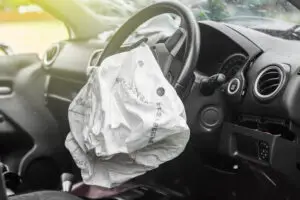
The damages you can collect in a car accident claim depend on various factors, including the severity of your injuries and their impact on your life. Generally, car accident victims can seek compensation for both economic and non-economic damages.
Economic damages refer to the financial losses you’ve incurred due to the crash, such as medical bills, lost wages, and property damage. Non-economic damages refer to more subjective losses like pain and suffering, emotional distress, and loss of enjoyment of life.
Working with an experienced car accident attorney can help you collect the maximum amount possible.
Economic Damages in a Car Accident Claim
Economic damages refer to the financial losses incurred due to an incident. These losses are typically easy to quantify as they involve measurable expenses with bills attached.
The following economic damages might be eligible for compensation in a car accident claim:
- Medical expenses: This includes all medical costs, from emergency treatment at the accident scene to hospitalization, rehabilitation, and ongoing care.
- Lost wages: If you could not work due to the injuries you sustained in the collision, you may be entitled to compensation for lost wages.
- Property damage: If your vehicle or other property was damaged, the cost of repairs or replacement will likely be covered.
- Loss of earning capacity: If you cannot return to work due to your injuries, you may be entitled to compensation for lost future earnings.
- Other expenses: These can include transportation, home care, and any other out-of-pocket expenses related to the accident.

Non-Economic Damages in a Car Accident Claim
Non-economic or general damages refer to losses that cannot be easily quantified or measured in monetary terms. This kind of restitution is designed to compensate the victim for a car accident’s emotional and psychological impact.
Examples of non-economic losses that may be recoverable after a car accident include:
- Pain and suffering include physical pain, discomfort, and emotional distress resulting from the crash.
- Loss of enjoyment of life: This refers to the impact the crash has on a victim’s ability to enjoy activities they once enjoyed.
- Loss of consortium: This refers to the impact the accident has on the victim’s relationship with their spouse or partner.
- Disfigurement or scarring: This includes any physical disfigurement or scarring resulting from the crash.
It’s important to note that non-economic losses, such as medical bills and lost wages, can be more difficult to calculate than economic ones. However, an experienced attorney can help you attach a dollar amount to your non-economic damages.
What Are Punitive Damages?
Punitive damages differ from economic and non-economic damages in that they are not meant to compensate the victim for their losses but to punish the at-fault party for their egregious behavior. For example, in car accidents, punitive damages are sometimes awarded if the at-fault driver drives under the influence of drugs or alcohol.
Suppose it can be proven that the at-fault driver was driving drunk. In that case, the victim may be eligible for punitive, economic, and non-economic damages. The purpose of punitive damages is to discourage the at-fault driver and others from engaging in similar behavior in the future.
It’s important to note that punitive damages are not awarded in every car accident claim. In order to be eligible for punitive damages, the victim or their attorney must prove that the at-fault driver’s actions were willful, wanton, or malicious. This can be a difficult legal standard to meet.

How to Maximize Your Compensation in a Car Accident Claim
After a car accident, it’s important to understand that you have the right to seek compensation for your losses. However, the claims process can be complicated and overwhelming, especially if you’re dealing with injuries and other consequences of the accident.
Here are some tips to help you maximize your damages in a car accident claim:
- Seek medical attention: If you’ve been injured in an accident, seeking medical attention should be your top priority. This is important for your health and well-being and establishes a record of your injuries, which can be used as evidence in your claim.
- Document the accident: If you can safely do so, gather evidence as soon as possible after a collision. Take photos of the crash scene, including any damage to your vehicle, and get contact information from any witnesses.
- Keep records of your expenses: Keep records of any expenses related to the crash, such as medical bills, vehicle repair costs, and lost wages.
- Don’t accept the first settlement offer: Insurance companies often try to settle quickly and for less than your case is worth. Don’t accept the first settlement offer without consulting with a lawyer.
- Consult with an experienced attorney: Our skilled lawyers have a track record of successful verdicts and settlements and can help you navigate the claims process and receive the maximum compensation available in your case.

Contact Our Personal Injury Law Firm
If you or a loved one have been involved in a collision and suffered injuries, seeking legal representation from a skilled personal injury attorney is vital. The attorneys at Rand Spear have 200 years of combined legal experience and will fight for the compensation you deserve.
We understand the devastating impact a serious accident can have on your life. We are committed to helping you get the money you need to cover medical bills, pain and suffering, and other losses.
Contact us today to schedule a free consultation and learn how we can help you with your claim.
Call or text (215) 985-2424 or complete a Free Case Evaluation form








